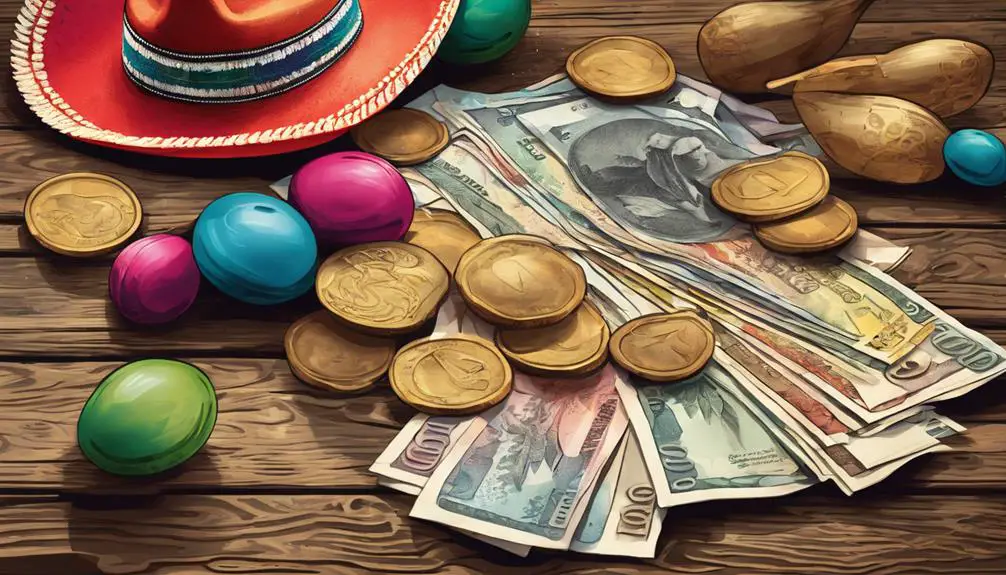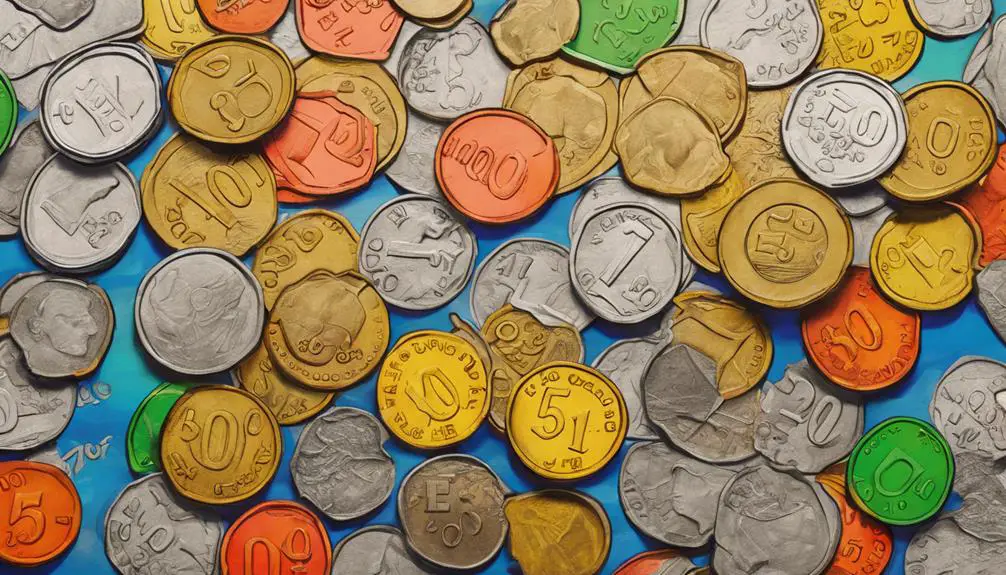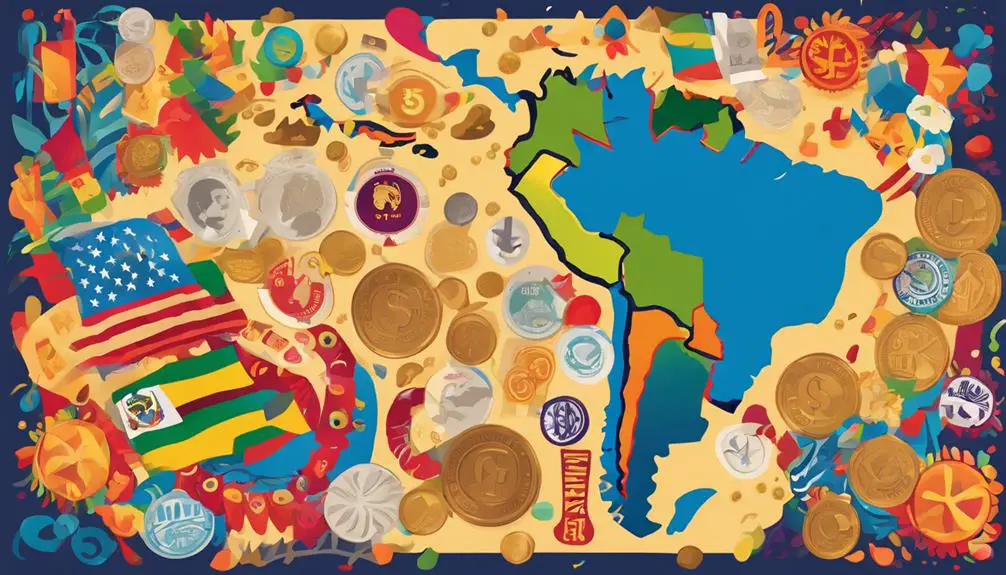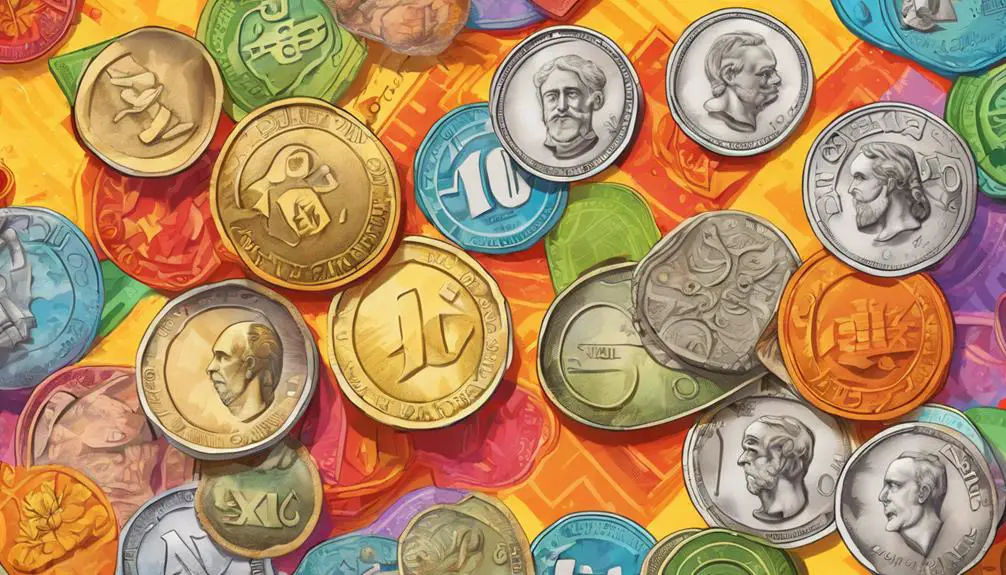You'll encounter a rich variety of slang terms for money in Spanish, each revealing the unique cultural nuances of its respective region. In Spain, you'll hear "pasta" or "guita" tossed around, while in Mexico, it's "lana" or "varos" that dominate everyday conversations. Argentina, on the other hand, uses "luca" to refer to cash. By using these terms, you'll not only sound more natural in your conversations but also gain insight into the local culture. As you explore the world of money slang, you'll discover more fascinating expressions that will further enrich your understanding of Spanish-speaking countries.
Money Talk Basics

Understanding the basic vocabulary and phrases related to money is essential when communicating about finances in Spanish, to effectively express yourself in everyday conversations.
You'll want to familiarize yourself with financial jargon, such as 'dinero' (money), 'gasto' (expense), and 'ahorro' (savings).
Mastering these terms will help you navigate conversations about personal finance, from budgeting to investing.
Developing a healthy money mindset is also vital, as it influences your financial decisions and attitudes towards spending and saving.
In Spanish, you can express your financial goals and priorities, such as 'quiero ahorrar para un apartamento' (I want to save for an apartment).
By grasping the fundamentals of money talk, you'll be better equipped to discuss financial matters confidently and accurately.
This foundation will also help you understand more complex financial concepts and nuances in Spanish.
Slang for Cash
Navigating everyday conversations about money in Spanish, you'll likely encounter informal expressions for cash that can help you sound more natural and relatable.
In Latin American countries, the cash culture is deeply ingrained, and having a grasp of colloquial terms can help you better connect with locals. One common myth is that using slang for cash is only for informal settings, but in reality, even in professional circles, these expressions are widely used.
In Spain, 'dinero' is the standard term for money, but in everyday conversations, you'll hear 'pasta' or 'guita' used interchangeably.
In Mexico, 'lana' or 'varos' are popular slang terms for cash.
Understanding these regional variations is crucial to avoid perpetuating money myths and to sound more authentic in your interactions. By incorporating these expressions into your vocabulary, you'll be better equipped to navigate the nuances of cash culture in Spanish-speaking countries.
Coins and Bills

You'll typically find that in Spanish-speaking countries, coins and bills are referred to using distinct slang terms that vary by region. For instance, in Mexico, coins are often called 'monedas' or 'centavos,' while in Argentina, they're referred to as 'moneditas.' Bills, on the other hand, are commonly known as 'billetes' or 'papelitos.' These slang terms are deeply rooted in local culture and are often used in everyday conversations.
When it comes to currency design, each country has its unique features, reflecting the nation's history, culture, and architecture. For example, the Mexican peso features iconic figures like Frida Kahlo and Diego Rivera, while the Argentine peso showcases the country's rich cultural heritage.
Coin collecting, also known as numismatics, is a popular hobby in many Spanish-speaking countries. Enthusiasts often hunt for rare coins, error coins, or limited-edition designs, which can be valuable and highly sought after.
Rich and Broke Expressions
When your wallet is overflowing with cash, you're said to be 'encienden la pila' in some Latin American countries, implying that your wealth is sparking like a lit fuse. This expression is often used to describe someone flaunting their wealth, showcasing their financial success. On the other hand, you might be "pasando hambre" or going hungry, meaning you're struggling to make ends meet.
Here are some expressions that highlight the contrast between richness and poverty:
| Expression | Meaning | Context |
|---|---|---|
| Encienden la pila | Sparking wealth | Flaunting wealth |
| Pasar hambre | Going hungry | Struggling financially |
| Ser un rajón | Being a spendthrift | Wasting money |
| Vivir en la luna de Valencia | Living on borrowed time | Secret poverty |
These expressions not only add flavor to your conversations but also provide insight into the cultural nuances of Spanish-speaking countries. Remember, being "encienden la pila" doesn't mean you're financially responsible, and "pasar hambre" doesn't mean you're literally starving. Understanding these idioms will help you better navigate everyday conversations and avoid misunderstandings.
Regional Money Slang

In various Spanish-speaking regions, you'll encounter distinct slang terms for money, each reflecting local culture and history. As you navigate Latin American dialects, you'll discover unique expressions that have evolved over time.
In Mexico, for instance, 'varos' or 'vilortas' refer to pesos, while in Argentina, 'luca' or 'luquita' are used to describe Argentine pesos. In Chile, 'pilas' or 'chorros' are common slang terms for Chilean pesos.
European variations of Spanish also exhibit distinct money slang. In Spain, 'pellets' or 'duros' are used to describe euros, while in Uruguay, 'fajo' or 'mango' refer to Uruguayan pesos.
Understanding these regional differences is essential when communicating effectively in Spanish. By familiarizing yourself with local slang, you'll be better equipped to navigate everyday conversations and cultural nuances.
Using Money Slang Like a Pro
Now that you're familiar with the diverse range of money slang across Spanish-speaking regions, it's time to incorporate these expressions into your everyday conversations.
To use money slang like a pro, you need to develop a money mindset that's comfortable with informal language. This means being confident in your use of crypto lingo, such as 'cripto' for cryptocurrency, and regional slang like 'plata' for money in Argentina.
When chatting with friends or negotiating prices, use money slang to sound more natural and build rapport.
For instance, instead of saying '¿Cuánto cuesta?' (how much does it cost?), ask '¿Cuánta guita?' in Argentina or '¿Cuánta plata?' in Colombia. This will show that you're making an effort to adapt to the local culture.
Frequently Asked Questions
Is Using Slang for Money in Spanish Informal or Formal?
When communicating in Spanish, you'll encounter regional dialects and cultural nuances that shape the tone of your interactions. In formal settings, you typically avoid using informal language.
However, when discussing money, using slang can be acceptable in casual conversations. But be cautious, as regional dialects may influence the perception of slang as informal or formal.
Can I Use Money Slang in Professional or Business Settings?
You might be surprised to know that 67% of professionals admit to using colloquial language in the workplace.
When it comes to using money slang in professional or business settings, you should exercise caution. While cultural norms may vary, industry standards generally discourage using informal language in formal environments.
To maintain a professional image, it's best to stick to formal terminology, avoiding slang that may come across as unprofessional or even confusing to clients or colleagues.
Are There Different Money Slang Terms for Different Ages or Generations?
You're wondering if different age groups have their unique money slang terms. Indeed, generational differences play a significant role in shaping age-specific slang.
For instance, younger generations might use terms like 'guap' or 'dough,' while older generations might stick to more traditional expressions.
You'll notice that each age group has its distinct linguistic preferences, reflecting their cultural and social backgrounds.
As you navigate different age groups, be prepared to adapt to their distinct money slang vocabulary.
Can I Use English Money Slang in Spanish Conversations?
'When in Rome, do as the Romans do' is a wise adage to keep in mind when communicating with Spanish speakers. When it comes to using English money slang in Spanish conversations, you'll likely face language barriers and cultural exchange hurdles.
While it's crucial to use familiar terms, it's important to adapt to local expressions to avoid confusion. Instead, make an effort to learn Spanish-specific slang to show respect for the culture and facilitate smoother conversations.
Are Money Slang Terms Used Differently in Latin America and Spain?
When communicating with people from different Spanish-speaking regions, you'll notice regional dialects influence how money slang is used. You'll find that cultural nuances shape the way locals express themselves.
In Latin America, terms like 'plata' or 'luca' are common, while in Spain, 'pasta' or 'duros' are more prevalent. Be mindful of these differences to avoid misunderstandings and guarantee effective communication.
Conclusion
You've mastered the basics of money talk in Spanish, from coins and bills to rich and broke expressions. You've even dipped into regional slang.
Now, it's time to put your skills to the test. Imagine you're at a street market in Mexico City, and a vendor whispers '¿Cuánto plata tienes?' (How much cash do you have?) to negotiate a deal.
With your newfound slang expertise, you confidently respond, 'Tengo unos cuantos pesos' (I have a few pesos), and the haggling begins.







